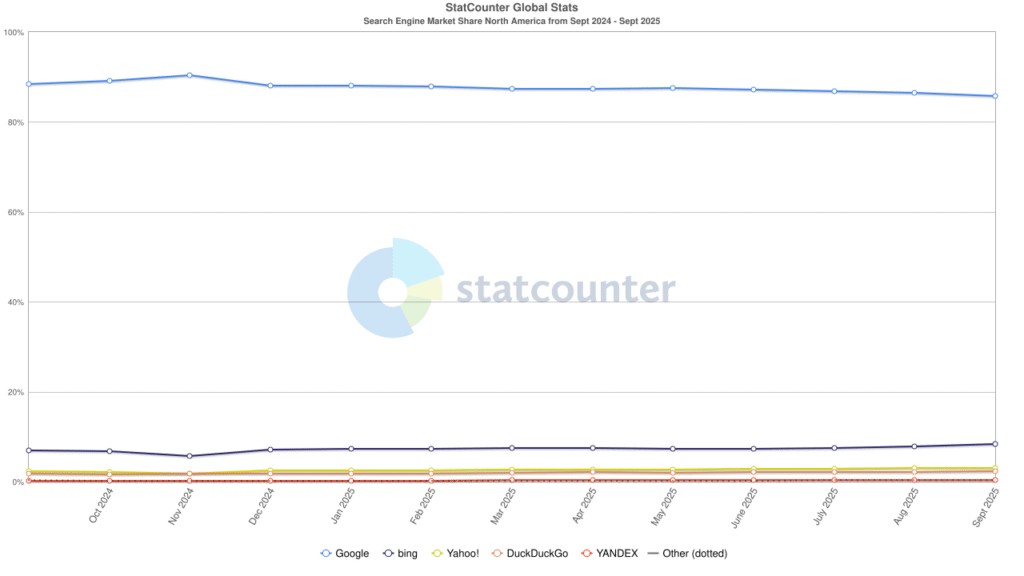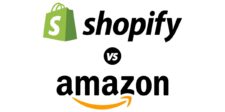This is a quick Google, Bing, Yahoo comparison and review for anyone interested in knowing more about these search giants. Bing, Google, and Yahoo are the most commonly used search engines on the Internet today, and the three leading English search engines in the world. In this review, we’ll be comparing their features and the advantages of using one over the other.
However, most people just want a straight answer to “Which one should I use?” So here’s the short version: Google wins for everyday search across most topics. Bing is great if you like summarized answers, visual search, and rewards. Yahoo covers the basics inside a familiar portal.
In the U.S. and Canada, Google still handles the vast majority of searches, with Bing and Yahoo a distant second and third, respectively. As of September 2025, the global market share is roughly Google ~90%, Bing ~4%, Yahoo ~1.5%.

Brief History & What’s Changed
Yahoo began in 1994 as a human-edited web directory that later added search and grew into a broad portal with Mail, News, Finance, and more. Google launched in 1998 and quickly became the default way people find information online. Bing joined in 2009 as Microsoft’s “decision engine,” emphasizing cleaner design and task-oriented results.
A turning point came between 2009 and 2010 when Yahoo and Microsoft formed a search alliance: Microsoft would power Yahoo’s web results while Yahoo focused on the portal experience and ads. That partnership shaped Yahoo’s search reality for much of the last decade.
Since the mid-2010s, several legacy Yahoo properties have been closed, including Yahoo Directory (2014), Yahoo Maps (2015), and Yahoo Answers (2021). Those closures matter because older comparisons still reference them. Meanwhile, market share has stayed lopsided, with Google dominating worldwide usage while Bing and Yahoo split a much smaller share.
The Evolution of AI in Search
AI has shaped search for years—long before today’s chat-style answers. In the early 2000s, engines began using machine learning to rank results, moving beyond exact keyword matches toward understanding intent.
A big shift came with Google Hummingbird (2013), which emphasized semantic search so engines could interpret the meaning behind queries. That paved the way for natural, conversational queries and the rise of voice search.
Next came neural networks. RankBrain (2015) helped Google interpret never-before-seen queries and adjust results based on patterns of user behavior. Microsoft pushed similar advances at Bing, applying deep learning to query understanding and image recognition.
By the late 2010s, AI powered everything from autocomplete to personalized results. The introduction of large transformer models—notably BERT (2019)—let engines parse context and relationships between words far more accurately. Search wasn’t just indexing the web; it was learning to read it.
All of this set the stage for today’s generative tools. For more than a decade, AI worked mostly in the background to improve relevance and personalization. The difference now is visibility: AI has moved front-and-center in the experience, summarizing, interpreting, and guiding the search itself.
What’s New in the AI Era with Google, Bing, and Yahoo
Google has layered generative AI on top of classic results. AI Overviews summarize information and link to sources, while Circle to Search and Multisearch speed up “what’s this?” moments on mobile.
Bing added Deep Search for optional, more exhaustive results on complex queries and rebranded Bing Chat to Microsoft Copilot, which powers concise, sourced summaries with follow-up prompts.
Yahoo continues as a popular portal with search integrated into its broader experience. It remains closely tied to Microsoft’s search stack while publicly iterating in the AI era.
The bottom line is that Google widened its lead through continuous updates and AI features; Bing became a credible alternative for summarized answers and visual search; Yahoo remains a solid homepage hub, with web results historically powered by Microsoft.
Google: Pros and Cons
Pros
- Consistently relevant results across most topics, with excellent local and Maps coverage.
- Helpful AI layer for quick “give me the gist” answers that still link to sources.
- Smooth mobile experience and strong visual lookups when you need to identify something fast.
- Time-savers like live busyness and richer place panels that make planning easier.
- Clear, centralized privacy and safety controls.
Cons
- Ads can push organic results lower on many queries.
- Many conveniences work best when you’re signed in—some users prefer a lighter footprint.
- AI summaries are improving, but not perfect. Important details are still worth a click-through.
Bing: Pros and Cons
Pros
- Concise, sourced summaries via Copilot that speed up learning without hiding the links.
- Optional Deep Search for complex, open-ended questions where you want a broader sweep.
- Clean results pages with solid image and video search.
- Smooth Windows/Edge integrations (collections, sidebar, sync) that reduce tab-hopping.
- Microsoft Rewards adds a small, steady perk for everyday use.
Cons
- Smaller footprint than Google; niche topics sometimes show fewer rich snippets and reviews.
- Like other search engines, AI summaries can miss nuance. So it’s worth clicking through when details matter.
- Some conveniences work best in Edge or when you’re signed in.
Yahoo: Pros and Cons
Pros
- Simple, portal-style homepage with quick access to Mail, News, Finance, and Sports.
- Steady, familiar results for everyday lookups without lots of settings to manage.
- Benefits from Microsoft’s underlying search stack, which keeps fundamentals consistent.
- Ongoing experimentation with AI-style answers and chat suggests more improvements are ahead.
Cons
- Fewer cutting-edge features than Google or Bing today.
- Limited advanced filters and customization for power users.
- Older guidance online can reference discontinued products (Directory, Maps, Answers), which no longer apply.
Other Search Engines
Not everyone wants the big three. Over the past decade, a wave of alternatives has grown by leaning into privacy, independent indexing, or a clear mission.
For privacy-first users, DuckDuckGo is the easiest switch. It avoids tracking and bundles its tools into simple apps and a browser, with optional AI answers you can fine-tune or turn off. Startpage takes a different route: it serves Google-quality results through a privacy proxy, so your queries aren’t tied to a Google account. Its “Anonymous View” lets you open sites through a protective layer—handy when you want results without the data trade-off.
If you prefer engines that build their own indexes, Brave Search and Mojeek stand out. Brave maintains an independent index and adds fast summaries, while Mojeek (UK-based and fully independent of Google/Bing feeds) keeps a strict no-tracking stance. Because these crawlers aren’t leaning on the giants’ indexes, they sometimes surface sources you won’t see elsewhere, which makes them useful second opinions for research.
Mission-driven options exist, too. Ecosia funds tree-planting and other climate projects with its ad revenue, pairing a familiar search experience with a transparent, impact-focused model. It’s a straightforward way to browse and do some good at the same time.
There are also niche and regional leaders. Qwant, based in France, emphasizes privacy for European users and supplements its own tech with partners where needed. Kagi is ad-free and subscription-based, aimed at power users who want speed and fine-grained control.
Outside North America and Europe, Baidu dominates in China, Yandex in Russia, and Naver in South Korea. If you’re researching those markets (or reading local-language sources), starting with the local engine usually returns a fuller picture.
SEO Implications
When it comes to SEO, the question isn’t how to build three different strategies for Google, Bing, and Yahoo. That approach spreads resources thin and leaves the biggest opportunities on the table.
Since Google commands nearly 90% of global search traffic, ranking well there should be the primary goal. Strong performance in Google usually translates into visibility on Bing and Yahoo as well, because the fundamentals (quality, authority, and clear site structure) overlap across search engines.
The reverse doesn’t hold. Ranking in Bing or Yahoo without traction in Google means missing out on the vast majority of potential clicks. That’s why most businesses are best served by a Google-first strategy.
Bing and Yahoo still play supporting roles. Bing’s desktop share is higher than mobile, its Copilot answers highlight concise, well-cited content, and its integration with Edge keeps a loyal user base. Yahoo, powered by Bing’s index, benefits indirectly from the same optimizations.
But instead of treating them as separate battlegrounds, it’s more effective to treat them as extensions of your Google-focused work. So the key takeaway is this: optimize for Google’s standards, and you’ll capture Bing and Yahoo along the way.
Google vs Bing vs Yahoo Comparison Wrap Up
Choosing a search engine comes down to what helps you get confident answers fastest. For most people, Google is the easiest default: deep coverage, polished local info, and handy visual lookups when you need them. Bing is a strong alternative if you like concise, cited summaries and a clean page—especially on Windows or in Edge. Yahoo remains a comfortable, portal-style home base for everyday lookups with Mail, News, and Finance a tap away.
If you’re still unsure, try a simple split test for a week. Set one engine as the default on your phone and another on your laptop. Notice which one you reach for first, how often you click results, and how confident you feel after each search. Keep a second engine bookmarked for quick comparisons; sometimes a different index surfaces angles you wouldn’t have found otherwise.
Lastly, quick tips for any engine:
- Click through when facts matter. AI summaries are a great jump-start, but the full pages give richer context, diverse perspectives, and up-to-date details. Your clicks also help keep the open web healthy.
- Try a visual lookup. When you’re staring at something on your screen (or in real life) and don’t have the words for it, image-based search is often the fastest way to “what’s this?”
- Set SafeSearch to your comfort level. Revisit the setting on shared devices so results stay appropriate for everyone.
Frequently Asked Questions: Google vs Bing vs Yahoo
The top three search engines in English-speaking markets are Google, Bing, and Yahoo. On a global scale, Baidu often competes with Yahoo for the third position depending on region and timing. For most businesses and users, this means Google remains the clear priority, while Bing offers additional reach and Yahoo provides exposure through Bing’s search infrastructure.
Google is not switching to Bing. They are separate search engines with their own technology and user bases. The confusion usually comes from the fact that Yahoo relies on Bing’s index, which makes Yahoo’s results look similar to Bing’s. It can also stem from devices and browsers, particularly Microsoft products, that set Bing as the default search engine. In some cases, headlines about partnerships in AI or advertising fuel the misconception, but none of these involve Google replacing its own search engine with Bing.
Newer or lower-authority sites often gain traction on Bing faster, while Google tends to reward stronger entity and trust signals over time. If you’re seeing a gap, continue to publish high-quality content, earn authoritative mentions/links, and refine technical basics (speed, internal links, structured data, etc.). Focus on Google first; Bing/Yahoo visibility usually follows.
Yes. Yahoo’s web search has historically been powered by Microsoft’s search stack. Optimizing for Bing typically benefits your Yahoo exposure as well.
Practitioners often notice faster wins on Bing when content earns early engagement and clear citations. Treat social as a distribution channel that can accelerate discovery—don’t rely on it as a sole ranking lever.
Timelines vary. Many sites see earlier movement on Bing, while Google may take longer as trust accumulates. Keep your cadence steady: publish useful content, interlink well, and earn real mentions from credible sites.
Publishing on reputable platforms can capture short-term demand while your site matures. But use it strategically. Contribute high-quality pieces that point readers to your canonical resource. Avoid spammy placements because those rarely age well.
Google, due to reach. You could cover Bing because it’s meaningful on desktop and powers Yahoo—but the simplest path is: nail Google’s standards, then treat Bing/Yahoo as extensions.
All three offer privacy controls, but if privacy is your top criterion, you may prefer alternatives like DuckDuckGo or Startpage. For the big three, review account settings and SafeSearch on any shared devices.
We empower people to succeed through practical business information and essential services. If you’re looking for help with SEO, copywriting, or getting your online presence set up properly, you’re in the right place. If this piece helped, feel free to share it with someone who’d get value from it. Do you need help with something? Contact Us
Want a heads-up once a week whenever a new article drops?







